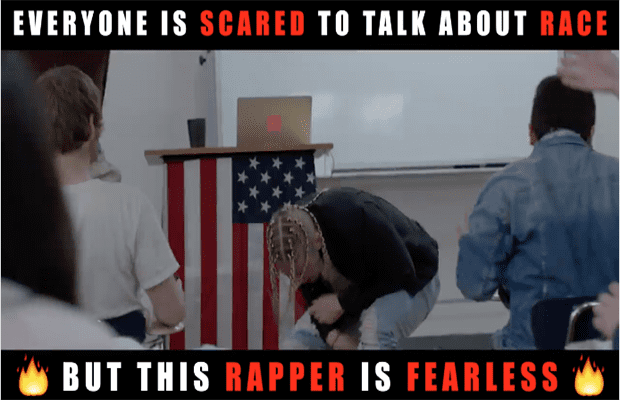Depending on the kind of circles you associate with online, the term ‘caption rap’ may mean absolutely nothing to you. Caption rap, collectively coined by hip-hop fans online, describes underground hip-hop artists. They are not signed to a record label, but promote their music through Facebook.
Facebook pages such as UNILAD Sound and Underground Rap World have been instrumental in many caption rappers’ the rise to fame. of many caption rappers. These pages regularly share songs and videos that attack mumble rap – the dominant sound of the newer generation of hip-hop artists, which emphasises phonetic reduction (neglecting or altering certain syllables in a word or phrase) with simplistic lyrical content, and heavy use of autotune.
The videos these artists produce are often edited by themselves, or the page sharing the video, to display large captions at the top and/or bottom of the frame, with click-bait-y text designed to capture the attention of scrolling users. Take rapper Nova Rockafeller for example: with over 60,000 likes on Facebook, they often use incendiary captions such as “THE BEST RAPPER ALIVE IS A WHITE GIRL LOL”.
No other rapper better encapsulates the problematic nature of ‘caption rap’ as a whole than former pro wrestler Tom MacDonald. MacDonald has numerous videos on his Facebook page containing self-made captions, praising himself in the third-person — “He looks like a mumble rapper / But he’s saving hip-hop”. He’s been amassing fans through his page for some time now, but his claim to ‘fame’ was the controversial single he released in February last year, ‘WHITEBOY’. Moving beyond the frequent and thinly-veiled racist remarks about ‘mumble rappers’, WHITEBOY is as close to a white empowerment anthem as you can get without saying as much in words. The video for this song has been uploaded to Facebook multiple times – once with the white supremacy-tied phrase “IT’S OKAY TO BE WHITE” in the description.
MacDonald is insistent, however, that he is not racist and has not participated in ‘racist activities’, which he mostly boils down to “owning a slave” or saying a racial slur. “You’re making me the villain by demonizing my race,” he effectively screams in the song’s third verse. He presents an incredibly outdated and one-dimensional view of racism. MacDonald seems to be more concerned with defending white people from online-degradation than legitimate systemic racism.
The mumble rap label is not exclusive to artists of colour – Lil Pump is proof of that. However, the common delivery and dialect heard in music of this kind largely stems from African-American vernacular english. The backlash that emanates from caption rappers is indicative of their racist biases. The belittlement of the currently dominant mumble sound in popular rap music by white fans of older, “real” hip-hop represents a denial of any developments being made new members of the genre. Such belittlement only further marginalises a generation of young, mostly African-American artists, and the culture they are inspired by.
Other caption rappers like Vin Jay and Mac Lethal are often adamant in their perception of ‘real rap’ as that which utilises an incredibly fast flow and/or lyrical prowess. Pages and subsections of hip-hop fans respond positively to their videos, due to this wordplay or discussion of ‘serious’ topics including political issues or mental health. However, songs that take a surface level approach to weighty issues, as caption rapping does, often have praise bestowed upon them merely because of their subject matter. This is a tokenistic and hypocritical version of what fans of ‘real hip-hop’ claim to respect, as it shows a disregard for any actual lyricism, wordplay, or insightful understanding about real-life issues.
Caption rap is, in many ways, fairly inconsequential to the culture of mainstream hip-hop. The substantial following or attention these artists gain from their videos has not yet translated into any sort of mainstream crossover appeal. This subculture is scarcely mentioned outside of online platforms. The most crucial concept to take away from this trend, then, is the colour-blind ideology artists and fans of this style take on to ignore the racial and cultural elements embedded within the hip-hop genre. Caption rap has the potential to harm the progression and sentiments of the real talent out there.





